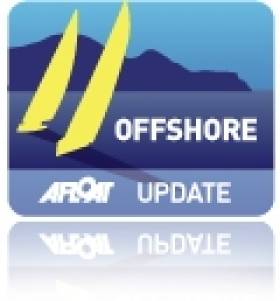Displaying items by tag: O' Siochru
Irish Offshore Sailing Makes Success of Debut Season
Irish Offshore Sailing, a new yacht training centre based in Dun Laoghaire, Co. Dublin is now launching its autumn winter calendar, having had a very busy first season, despite the current economic climate.
The school is an RYA and ISA recognised yacht training centre and was set up by Corkman Rónán Ó Siochrú in January 2011. The school runs liveaboard sailing courses onboard a 2002 Jeanneau Sunfast 37 called "Desert Star".
Sailing school Principal, Ronan O Siochru attributes much of the schools success to date to holding onto a set of core values throughout each course: A commitment to professional, affordable sail training in a 'warm friendly Irish atmosphere'. "We have come into the market under no illusion as to the difficulties in the tourism and leisure sector in a recession, but we have priced our courses in a way that reflects realistically what people can afford to pay for a sailing course.
The most important key to our success, has been a driven campaign to bridge the gap between the large number of people who have never set foot on a sailing boat, and a liveaboard sailing course! We offer evening and afternoon 2 and a half hour sails at €30 per person on the days when the yacht is not working on a practical course. This has worked extremely well for us in getting clients to take that leap of faith in booking onto a weekend liveaboard sailing course, and in spreading the word that we are a new training centre and are here to stay!
I have always had a personal commitment, to help break down this notion that sailing is a sport for the elite, having spent two years living in France, I saw how the French promote sailing in their country in the same way the GAA promote hurling and football."
Irish Offshore Sailing also offer sailing courses through Irish and French. This is a niche in the market and is certainly likely to take off over the coming year. Despite running a few very successful courses, it has had to sit on the back burner this summer, due to the business of the summer season and a lack of time to generate an effective marketing campaign. Irish Offshore Sailing are also looking forward to next season in getting an offshore racing campaign off the ground.
O' Siochru skippered a Sunfast 37 in the Round Ireland Yacht Race to a 23rd place overall with a crew of novice sailors.
When asked, how do you handle skippering a yacht offshore with the kite up in the dark with a bunch of beginner sailors he smiles......" its amazing what yacht crews can do when they just do some training, and iron out problems with each manoeuvre!" "We come across quite a lot of sailors in this country who become so eager to be boat owners that they miss out on that important learning process of being onboard yachts with experienced sailors to learn from. It was amazing even during the boom, how some people could fork out over €100,000 for a yacht and yet, be unwilling to part with €650 to learn how to use it!
The height of the summer season is starting to come to an end, but it looks like Irish Offshore Sailing has become established as a sailing school on the East Coast, with bookings filled into the end of October and over 1,000 hits per month on their website.
"I cannot believe it has worked out so well for us, I sailed Desert Star into Dun Laoghaire on the 22nd of April, maxed out on all credit, without a penny in the bank, but with a lovely yacht ready for work, a good website and a burning ambition to see it succeed...... and I think we have done okay! Most importantly, I've made a job for myself that I like.... I love sailing, I like working outdoors, I love teaching and (despite its headaches) I like working for myself!





























































